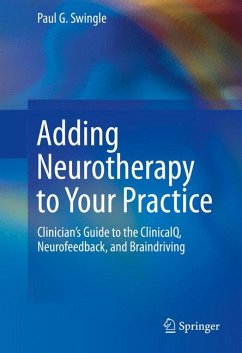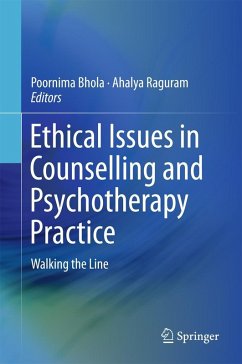
Practitioner's Guide to Ethics and Mindfulness-Based Interventions (eBook, PDF)
Versandkostenfrei!
Sofort per Download lieferbar
88,95 €
inkl. MwSt.
Weitere Ausgaben:

PAYBACK Punkte
44 °P sammeln!
This book focuses on the role of ethics in the application of mindfulness-based interventions (MBIs) and mindfulness-based programs (MBPs) in clinical practice. The book offers an overview of the role of ethics in the cultivation of mindfulness and explores the way in which ethics have been embedded in the curriculum of MBIs and MBPs. Chapters review current training processes and examines the issues around incorporating ethics into MBIs and MBPs detailed for non-secular audiences, including training clinicians, developing program curriculum, and dealing with specific client populations. Chapt...
This book focuses on the role of ethics in the application of mindfulness-based interventions (MBIs) and mindfulness-based programs (MBPs) in clinical practice. The book offers an overview of the role of ethics in the cultivation of mindfulness and explores the way in which ethics have been embedded in the curriculum of MBIs and MBPs. Chapters review current training processes and examines the issues around incorporating ethics into MBIs and MBPs detailed for non-secular audiences, including training clinicians, developing program curriculum, and dealing with specific client populations. Chapters also examine new, second-generation MBIs and MBPs, the result of the call for more advanced mindfulness-based practices . The book addresses the increasing popularity of mindfulness in therapeutic interventions, but stresses that it remains a new treatment methodology and in order to achieve best practice status, mindfulness interventions must offer a clear understanding of their potential and limits.
Topics featured in this book include:
. Transparency in mindfulness programs.
. Teaching ethics and mindfulness to physicians and healthcare professionals.
. The Mindfulness-Based Symptom Management (MBSM) program and its use in treating mental health issues.
. The efficacy and ethical considerations of teaching mindfulness in businesses.
. The Mindful Self-Compassion (MSC) Program.
. The application of mindfulness in the military context.
Practitioner's Guide to Mindfulness and Ethics is a must-have resource for clinical psychologists and affiliated medical, and mental health professionals, including specialists in complementary and alternative medicine and psychiatry. Social workers considering or already using mindfulness in practice will also find it highly useful.
Dieser Download kann aus rechtlichen Gründen nur mit Rechnungsadresse in A, B, BG, CY, CZ, D, DK, EW, E, FIN, F, GR, HR, H, IRL, I, LT, L, LR, M, NL, PL, P, R, S, SLO, SK ausgeliefert werden.
Alle Preise in Euro und inkl. der gesetzl. MwSt. | Innerhalb Deutschlands liefern wir preisgebundene Bücher versandkostenfrei. Weitere Informationen: bitte hier klicken
Support
Bitte wähle dein Anliegen aus:
Rechnungen
Bestellstatus
Retourenschein
Storno












